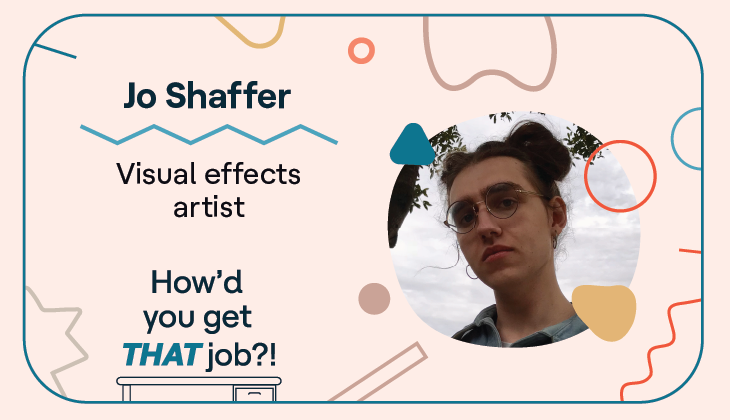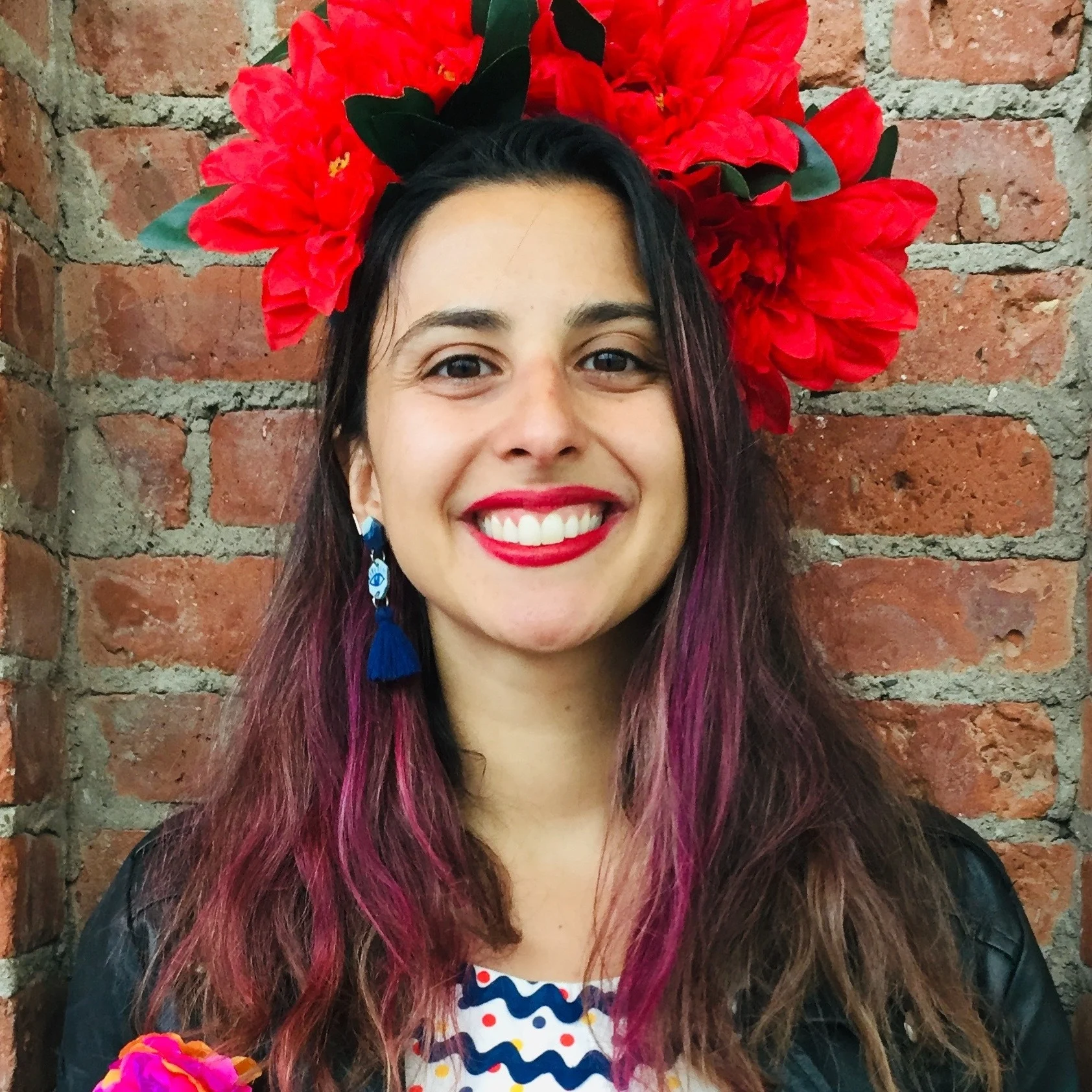Stay in the know
All our latest podcasts delivered right to your inbox.
Sometimes, people with ADHD can thrive in jobs that require hyperfocus. That’s true of Jo Shaffer, a self-taught visual effects artist who says working on motion graphics is a perfect fit for how their mind works. Learn how Jo gets paid to come up with fun, computer-generated graphics for companies and advertisers.
Jo also shares their thoughts on the connection between having ADHD and being nonbinary. The answer might surprise you.
Listen in. Then:
Check out ADHD memes created by Jo.
Episode transcript
Eleni: From the Understood Podcast Network, this is "How'd You Get THAT Job?!," a podcast that explores the unique and often unexpected career paths of people with learning and thinking differences. My name is Eleni Matheou, and I'm a user researcher here at Understood. That means I spend a lot of time thinking about how we find jobs we love that reflect how we learn and who we are. I'll be your host.
Our next guest creates the motion graphics you may see in videos, visual ads, and GIFs. Jo Shaffer is a visual effects artist from Madison, Wisconsin.
Jo: Yes.
Eleni: Jo identifies as nonbinary and uses they/them pronouns. Jo also has ADHD. Welcome to the show, Jo.
Jo: Thanks for having me.
Eleni: I don't know why I struggled saying Wisconsin.
Jo: Yeah. People are mystified in New York. People think that it's like, I don't know. It's some truly, some faraway planet. People have laughed at it before. So I've got a thick skin about it.
Eleni: Is that the best way to describe your job?
Jo: Yeah. I work as a visual effects artist, and mostly I have been working on commercials. So that would be anything from, if there's a logo on a billboard that someone isn't cleared to show in their commercial, I will take that out. Or if they just want, like, to add a whole billboard in, or if they want an explosion, blood, smoke, rain, all the stuff that you can't do in real life essentially, or didn't have the money to do.
Eleni: So would I have seen any of your stuff anywhere out in the world?
Jo: Yeah. So I would say my current claim to fame is that Tina Fey show "Girls5Eva." I don't know if I'm pronouncing that right, but I, uh, did some object removal on the opening credits. So it's not like I even added something you'd recognize, but I cut everybody out of the background so that stuff could go in behind them.
Eleni: Nice. Well, I love Tina Fey's and that is a great claim to fame.
Jo: Yes. Yeah, it was very exciting. And I was shocked that they hired me. Like, why me, isn't there somebody else for this?
Eleni: When I heard "motion graphics" or like "visual effects," I really associate that with drawing. Is that a fair assumption? Like what is it really about? How would you describe it?
Jo: Yeah, it's interesting because I actually got into visual effects or just — I would say maybe "computer-generated imagery" is maybe the best umbrella term — but I got into it because I wanted to be able to paint hyper realistically or draw hyper realistically, but I just felt like I couldn't do it. I felt like I was not able to, I guess, put the time in and the idea of getting to automate visuals without getting into all the weeds of the technical stuff, being able to have a means of computing lighting scientifically rather than approximating it, was really interesting to me. And I still think drawing has been extremely valuable and I definitely use it and just enjoy it. But I view it almost as an alternative to sort of classic visual arts.
Eleni: So when you said you really wanted to be able to do hyper real things, but you felt like you couldn't really do it, do you mean through like more manual drawing?
Jo: Yeah. Yeah, totally, like the classic stuff that you need to do, like rendering the human form, really understanding value. And obviously all those things still come into play. But with drawing or painting, it's all kind of channeled through your hand, which I found that difficult at the time. This was also before I started taking meds for ADHD. So I think since then I have kind of come back around and come to appreciate the discipline of that a little bit more. But it just took so much repetition, which is silly because I have now spent years and countless hours practicing this other thing.
Eleni: What is it about visual effects or computer-generated graphics that you think is less repetitive or more appealing than drawing?
Jo: Being able to just press a button and get a result felt like alchemy, honestly. Like you would mess with all these settings, get all these ratios, right? And then press a button and something would come out and you could be surprised by it. And I like that it incorporated some randomness and some chance, and I like that it felt more interactive and frankly more like a video game.
Eleni: It's interesting. Yeah. Cause I never really thought of it like that. It gives you more of like that instant satisfaction. Or even just like more of an instant feedback. It's like you do a thing and then you see the output more quickly.
Jo: And it's more surprising too, I think, which I appreciate.
Eleni: Yeah. So it sounded like you had an interest in like creating those types of effects. But how or when did you decide to pursue it as a career?
Jo: Yeah, it was a very slow process because I didn't think that I could actually do it or get paid for it, but I really just couldn't stop doing it. I guess, hyper fixation. I just would spend like every night, till 4 a.m., just messing around with it. And that honestly took like two or three years until I was finally like, oh my God, I think I could maybe get paid for this. And I'm still, frankly — I mean, it's the type of thing where once you are in, you can really make a good living. And there's a lot of work because it's a pretty specialized field, yada yada, but in my experience, It took a long time to really like, get to the point where I could be paid for it.
Eleni: Yeah. So you said you were just messing around in your own time. So would you say that you were self-taught?
Jo: Yeah. I took one class in this program called Maya, then everything from there is self-taught. I really wish I had watched more tutorials at the beginning. Cause I think I could have cut about a year down from how long it took me to learn everything. Again, chalk that up to ADD. But I have a very specific self-directed learning process that is not always the most efficient, but it's the way I live my life, I guess.
Eleni: How did you go about learning?
Jo: Very haphazardly, I would say. I mean, I think the way people traditionally recommend it is to just really focus on function, which is to say, you know, pick something that you need to do and then learn how to do everything specific to that. Part of what took me a long time to learn about these programs is that they are so open-ended that even the people making them don't really have a great idea of like everything you could do in it.
So I was looking, I think, a lot of the time for just like a really ironclad way to do something. And I found it really liberating when I heard somebody compare these effects more to recipes. Like, you know, you have all these techniques and ingredients that will probably ultimately create this kind of a fact.
And so I think that's something that suits me, is just the fact that no task is ever quite identical. It's always informed by just what's in the image.
Eleni: Yeah. That's pretty cool. So there's an element of experimentation. And as you said earlier, like surprises and you know, the ability to be creative with it and kind of figure it out each time on your own. That's really cool. Now, I believe you went to film school before deciding to focus more on visual effects. Tell me about that.
Jo: I went to film school and I thought I would be an editor just because it was the trade, I guess, that I thought I could do, what I had been doing. Film was always kind of my main thing that I really wanted to do. The first, like real visual effects I did was I wrote and directed a feature film, which is sort of making the rounds through festivals and stuff now, and we just couldn't afford visual effects. So the first shot I ever started working on was a gigantic storm cloud. And I was surprised, I think, by how much it still kind of plays by the rules of traditional filmmaking stuff. It's just applied through a very specific kind of process. And I think this is part of what I enjoy about visual effects, is it doesn't really matter how you did it, if it looks right. It's all about perception, I guess, and about understanding how much people perceive and what they're more likely to miss, or what their eye's going to gravitate towards and knowing how to lead an eye or disguise something from someone's eye, which is all stuff that a filmmaker's doing.
Eleni: Yeah. So you talked a little bit about hyper fixation. Do you want to talk about any other ways ADHD shows up in your work? And also perhaps like how it makes you good at what you do?
Jo: I mean, I think it's a tricky combination because on one hand, I think it makes it very easy for me to jump into something and to feel comfortable with a little bit of chaos — just because there's so much technical stuff, but it's never quite gonna work right. So I don't know if this is true for all people with ADHD, but for me, definitely, having a little bit of chaos going on, I've found that it's like ADHD, it makes it helpful for me to just really like be able to switch between things quickly and keep adjusting my plan. Because in visual effects, like the person you're working for almost never knows how visual effects work. So like there's always going to be so much miscommunication and it's so much on you to be able to adapt because they don't know what they want, but they know what they don't want. And they'll fire you if they get what they don't want.
So, yeah, I think that flexibility is really useful. I think obviously time management is maybe the negative end of that or the thing that I've really had to be militant about, because if you hyper fixate too much, you can literally spend infinity on this stuff. And there's just a point of diminishing returns, I suppose, which you have to know when that point comes.
Eleni: Those are both themes that we've heard a lot from people. So this idea of being comfortable with chaos has come up quite a bit, actually. And this idea of being comfortable with a lot of like change and ambiguity and having a flexible plan, you know, all of those things come up a lot. And maybe this doesn't apply to everyone, but it applies to me. Like that's what I love about this podcast, that everyone can really share their unique experience and how it applies to them. Because of course not everything applies to everyone. But it's also really fun when we hear these commonalities too.
So what about when you were growing up? Like how did some of the challenges with ADHD come up for you?
Jo: I think the biggest thing with regard to that, that I find myself just like ruminating on the most maybe, is what I thought math was like as a kid. The way that I think — at least I was taught math and I would venture to guess most people — it almost reminds me of learning Latin from like a strict German school in the late 1800 or something. Like it's just purely about memory.
And I don't know, I had such a narrow idea of what math was. And my dad sent me a picture of like a math notebook I had the other day and it had all these spirals in it. Which at the time was doodling, but I just found it funny because now I view something like a repeating spiral pattern as math. Procedural geometry is a huge part of what I do.
Eleni: So interesting.
Jo: Yeah. Like manipulating patterns and understanding how layers of shapes can create different things and sort of what mathematical formulas, you know, are good for different things. Like noise functions, for example, which I don't even fully understand, but it's basically just a way of creating, like static would be one example of noise. But there are all these different types of noise functions, which are used to create smoke and atmospheric effects and stuff. And I just didn't know that math is just life and that it works so well with art. I thought it was like calculators.
Eleni: I love that because I think so many people have that assumption that math has like no real-world application. Even though you didn't like it at school, you found a real-world application for it that you actually really enjoy.
Jo: Yeah, and I wish I'd paid more attention. Like trig, for example. If I had paid more attention to trig, I could do all this crazy stuff. I mean, I'm in the process of relearning it now, but that would be so helpful in like creating a mountainside and figuring out where to place the rocks, because I could tell where to place the rock based on the angle of, you know, stuff like that.
Eleni: Yeah. I feel like you blew my mind a little bit there and I hope other people have been able to make that connection, too, because I love thinking about how math and science and art can actually be really intertwined a lot of the time.
Jo: Yeah, totally.
Eleni: I know that you said you spent a lot of your time, like really hyper focused and sometimes that means that you can kind of spend infinity time on things. Are there other ways that you also express yourself?
Jo: Yeah, my partner makes fun of me because I mostly only do this stuff, but I'm trying to think of what I do outside. Part of what I like about this job is I can listen to audiobooks during it. I have trouble reading, but for whatever reason, my brain absorbs audiobooks really well. I'm very interested in Cold War history. And state crimes, I guess like crimes against humanity committed by the United States government and the NATO bloc of countries. So it sounds like I'm joking, but I swear to God, this is a huge part of my life. Most of my life is spent listening to audiobooks about state crimes and state terror perpetrated by the United States — while doing visual effects.
Eleni: Oh my God. I love hearing about people's obscure interests. But also like you kind of just breezed over that, but how cool that you can listen to audiobooks and be doing something while working, like simultaneously.
Jo: Yeah, it's like the best part of my job, you know.
Eleni: It's so cool, you know.
Jo: It's so good.
Eleni: I love that. Well, in terms of other interests, I know you're also in a band. Do you want to talk a little bit about that?
Jo: Yeah. I play bass in a band called the Ophelias. We just put a record out called "Crocus." I just really enjoy it being the thing that is just pure instinct in my life. There's not a lot of thought involved and like on tour, I mean, I'm in the process of trying to figure out a good way to be able to be on tour and do visual effects stuff, which is kind of tricky because you need so much processing power.
But for the most part, I would say it's a really nice counterbalance, just because you really can't think too hard about it all the time. I mean, some people would probably disagree, but for me, I really love that it just comes and you don't have to be analytical.
Eleni: Interesting. Yeah. It sounds like you can be really in the moment with it.
Jo: Yeah. Definitely. Visual effects is so laborious. Everything has 10 steps associated with it. So it's nice to just be able to pluck a string and a note comes out.
Eleni: So at the start of the interview, I introduced you as nonbinary in terms of gender. Do you think there's any connection between your gender identity and your ADHD?
Jo: I don't know if there's a direct connection I could draw. I mean, I think it all comes together to feed into like a world view. I'd say, mostly it just makes me angry more than anything. Just rage. Honestly. I wish I had a better, happier answer, but yeah, I just mostly feel angry about it, just at the world.
Eleni: Do you want to say a little bit more about where the anger is directed or what you're angry about?
Jo: Yeah. No, it's a good question. It's hard to unpack and I mean, clearly I'm still figuring it out. I keep forgetting how old I am. I'm 25. I mean, I think it's so easy if with ADD stuff you're just very often put in a position where people think that you're less competent than you are. I mean, that's part of why I like visual effects is because I know I'm competent. And I know that I even know what I'm doing. So it feels like a place where I feel in control. I mean, I think people get upset when they feel like they don't have control, right?
And with gender stuff, it's more just like fear of getting killed on the street. And that just transmuting itself back into rage. I don't think that's going to happen to me. I think that's probably a little out there, but it could. If I'm wearing feminine clothing, I definitely am bracing to get hit over the head. So yeah, it's hard to know where to put that stuff.
Eleni: And it's definitely not an unfounded fear. We know gender violence is rampant in this country.
Jo: Yeah, definitely. Yeah. It's funny. I thought that would be more of a big deal traveling around on tour. But I found that people who work at gas stations are generally very friendly and understanding, or that's probably the person you see most on tour. They've always been very nice to me. The only time it was weird was somebody told us not to stop at a town in Utah because they said we wouldn't be safe. But other than that, it's been good.
Eleni: Well, in that instance, that might've been a helpful advice.
Jo: Yeah, no, I'm glad. I would definitely rather hear that than not hear that.
Eleni: Well, thank you for sharing all of that. And the reason that I asked too is, you know, we talk a lot about layered identities and they often do connect in some way if people feel like othered or different.
Jo: Yeah, totally. Everybody has like a mound of stuff they have to figure out about themselves to feel like they can live in the world without exploding. And it's like one more thing to figure out.
Eleni: I think I just have one more question. And given we had that whole conversation about being self-taught, do you have any advice for people that may be not interested in pursuing like a more traditional or structured education and have like some sort of interest that they would like to build on or pursue?
Jo: Definitely. There is obviously like a class element to this stuff, because you need time. And time it takes money. So I feel maybe a little bit sheepish offering blanket advice, because I know that different people have different amounts of time. I would say specific to visual effects: Don't pay for anything unless you're positive you have to. You can do it for free, at least for starters. It truly is essential because you cannot do this without the software, and the software is way too expensive. So you got to figure out how to scam it a little bit, a few free trials in a row or whatever. If you were pursuing the self-taught route, you're probably an obsessive type and that's good. It's good to be obsessive about the right things, but definitely just have a little part of your brain that's like, what's the broad plan here? What am I trying to learn this month? What would be good to learn next month? If you even just pay a little bit of attention to the structure of how you're learning stuff, then you just let your obsession fuel the day-to-day stuff, you will be surprised how fast you learn in my experience.
Eleni: Thank you so much for joining me today, Jo.
Jo: Yeah. Thank you for having me.
Eleni: This has been "How'd You Get THAT Job?!," a part of the Understood Podcast Network. You can listen and subscribe to "How'd You Get THAT Job?!" on Apple, Spotify, or wherever you get your podcasts. And if you like what you heard today, tell someone about it. "How'd You Get THAT Job?!" is for you. So we want to make sure you're getting what you need. Go to u.org/thatjob to share your thoughts and to find resources from every episode. That's the letter U, as in Understood, dot O R G, slash that job.
Do you have a learning difference and a job you're passionate about? Email us at thatjob@understood.org. If you'd like to tell us how you got THAT job, we'd love to hear from you. As a nonprofit and social impact organization, Understood relies on the help of listeners like you to create podcasts like this one, to reach and support more people in more places. We have an ambitious mission to shape the world for difference, and we welcome you to join us in achieving our goals. Learn more at understood.org/mission. "How'd You Get THAT Job?!" is produced by Andrew Lee and Justin D. Wright, who also wrote our theme song. Laura Key is our editorial director at Understood. Scott Cocchiere is our creative director. Seth Melnick and Briana Berry are our production directors. Thanks again for listening.
Host
Eleni Matheou
leads user research for Understood. She helps Understood to center its work on the lived experiences and voices of people who learn and think differently.
Latest episodes
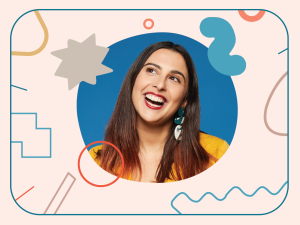
June 28, 2023
In the series finale of How’d You Get THAT Job?!, host Eleni Matheou unpacks what we’ve learned about how people thrive at work.

June 14, 2023
Nathan Friedman is the co-president and chief marketing officer of Understood.org. And he has dyslexia and ADHD. Learn how he got into the C-suite.
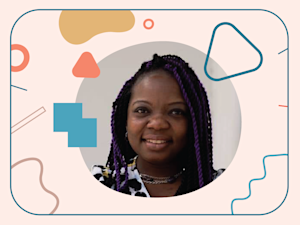
May 31, 2023
Dr. Loucresie Rupert is a child, adolescent, and adult psychiatrist with ADHD. She didn’t have an easy time getting her diagnosis as a Black woman.
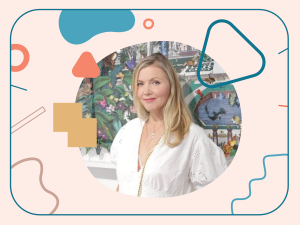
May 17, 2023
Kristjana Williams is a London-based Icelandic artist with dyslexia. She wasn’t diagnosed until she was 25, and now she has her own studio.

May 3, 2023
Aideé Chávez Frescas has ADHD, and is a senior social media manager at Understood. Her posts help end stigma and show others they’re not alone.
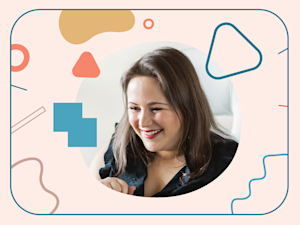
April 19, 2023
Alex Gilbert is a career coach with ADHD and dyslexia. After working in leadership development for years, she started her own coaching business.
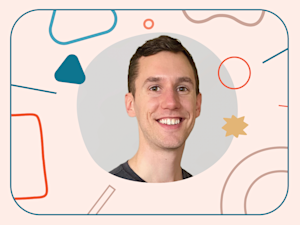
April 5, 2023
Dan Reis was diagnosed with ADHD during the pandemic. Now, he’s made it his mission to explore coping strategies to help him get his work done.
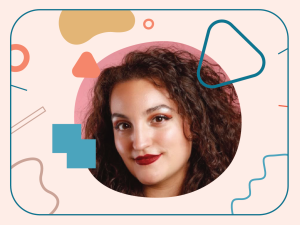
March 22, 2023
Rachel Basoco’s two jobs keep things interesting for her ADHD. She works full time at Fidelity, and part time at 11:11 Media, Paris Hilton’s company.
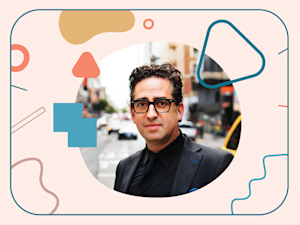
March 8, 2023
Gil Gershoni says that everything he does is dyslexic. He founded the branding firm Gershoni Creative and hosts the Dyslexic Design Thinking podcast.
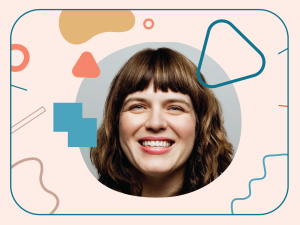
February 22, 2023
Claire Odom is a psychotherapist with ADHD. She’s also a disability inclusion consultant who has advice on navigating the workplace.
